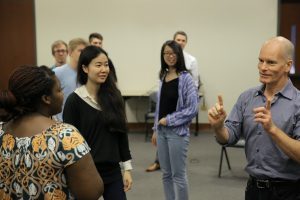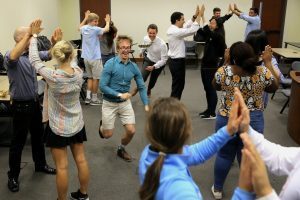News & Stories
Meet our profs: Greg Hohn
Business communication professor Greg Hohn (BA ’85) talks about improvising his career and how playfulness affects creativity and teamwork.

Greg Hohn (BA ’85) works with his Applied Improv students.
What do you teach at UNC Kenan-Flagler?
I teach Applied Improv, where the idea of putting what you use on an improvisational theater stage to work in non-theatrical settings. I usually boil it down to 3 C’s: communication, creativity and collaboration. Another really big part of improv is being present in the moment and thinking on your feet – trying to get out of your head and into the here and now.
What were your professional aspirations after college?
I had no idea what I wanted to do when I was in school. An ex-girlfriend told me that Transactors, the longest running improv group in the South, was having auditions. I tried out and they asked me to join. Seven years later – in 1996 – they asked me to direct!
My dad was very worried I was doing something ridiculous – and I kind of was. A casting director I met at a festival said she’d take a meeting with me and I wound up in Los Angeles in ’97. I didn’t like L.A., and career-wise I wanted to do something more useful, so I decided to come back to Chapel Hill and develop the applied improv curriculum.
I was at UNC as an undergrad. If you had told me then that I’d be here 35 years later doing improv and teaching at a business school – the Business School – I would have said you were crazy. I sort of improvised my career, some might say. But that’s the cool thing: you pursue something that you’re interested in and it could lead to something you couldn’t have imagined from the perspective of where you were before. You take a step and the next step appears.
When did you think to combine the disciplines of business and improv?
Something that was abundantly apparent early on was that people were using improv not just on stage, but in everyday situations. The principles and techniques that make for a good improviser also make for a professional who is good at collaborating – no matter what their field. Jim Dean, who was MBA Program associate dean at the time, told me, “When you submitted your proposal, I thought ‘Greg doesn’t know a lot about business, but he knows about some other things.’” He helped me refine my plan, and over the years I’ve paid attention to my students’ feedback. I started in 2000, and in 2012 I became full-time and started teaching the Undergraduate Business and Master of Accounting students, as well as the MBAs.
How do your students benefit from this curriculum?
I’ll hear back from graduates who say, “I use that class [Applied Improv] every day. It helps me handle pressure, get out of my head, listen.” In evaluations, students write things like, “I’ve gotten to know people better in this class than I have in any other class.” I think there’s great value in that because we talk about why it’s hard to be vulnerable in front of a group of people but why it’s necessary if you want to be trustworthy and inspiring. A lot of it really does have to do with overcoming fear and emotional baggage. And as a result we get to know each other, trust each other, like each other. These are the soft skills that we talk about that are helpful in getting a job and moving forward in your career – it’s that connection.

Applied Improv: Not your typical b-school class!
What differentiates UNC Kenan-Flagler from other business schools?
I have found that people here seem to get along really well – there’s a strong sense of collaboration and collegiality. In my experience working with theater departments, I’ve been amazed at how much acrimony and back biting is going on. It’s theater! We’re doing plays – it’s supposed to be fun!
I would say we just have a very positive environment here. People make assumptions about what a business school is or what business students are, but we have people who are trying to do so many different things with their studies. We have sustainability specialties, people who are learning how to run not-for-profit organizations better, and some people who are going to be working in fields more traditionally associated with an MBA education. I love working here. I wake up and go to work and just feel like the luckiest person in the world because I enjoy what I do and I enjoy the people I work with.
We’re known as a community that lives our values. How have you seen our students demonstrating this?
I see teamwork all the time. For my MBA students, their final exam is a performance. What strikes me every time is how everybody’s got each other’s backs. They’re all trying to make each other look good. It makes for good improv, and I think it makes for a good b-school.
One of the interesting things, too – especially in the MBA Program – is that there’s a lot of competition. The difference for me and what I’m doing is that it’s so much more about collaboration and being playful. There’s a place for that in the competitive world as well. A lot of times if you’re looking at someone as a potential collaborator instead of a competitor, you might find a better win-win than if you’ve got that competitive mindset.